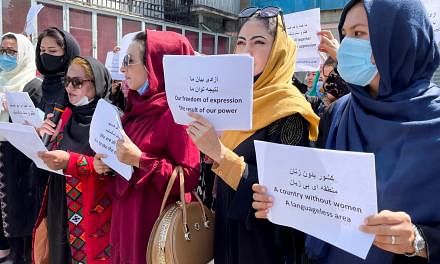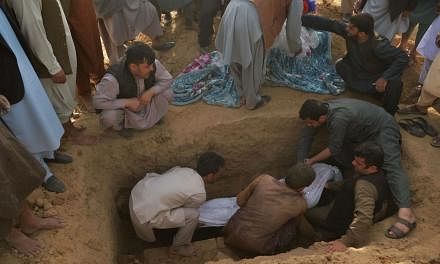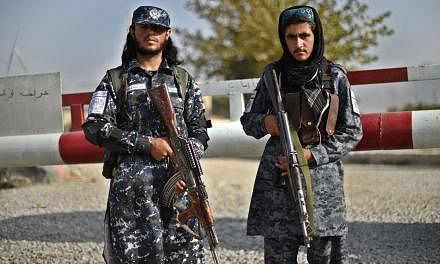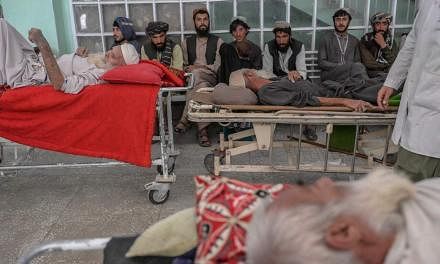WASHINGTON (BLOOMBERG) - Just last month, United States President Joe Biden defended his Afghanistan pullout by saying that "the likelihood there's going to be the Taleban overrunning everything and owning the whole country is highly unlikely".
The images of Taleban fighters inside the presidential palace in Kabul on Sunday (Aug 15), after a series of provincial capitals fell in rapid succession and the nation's President fled showed just how wrong Mr Biden's prediction has been.
Instead of an American-trained Afghan military staving off Taleban militants for months or longer, the US' longest war is ending with a hasty evacuation of diplomats from Kabul's airport.
Their sudden departure is raising difficult questions about Mr Biden's approach to the conflict, and creating a spiralling political calamity for a president who had promised to be a sure-handed steward of US foreign policy.
And while Americans were left recalling the harried final days of Saigon at the end of the Vietnam War, the US' biggest adversaries saw a potent sign of America's vulnerabilities and shaky claim to leadership after the tumult of the Trump years.
Even some close allies could not hide their frustration.
"Nobody wants Afghanistan, once again, to be a breeding ground for terror," British Prime Minister Boris Johnson said on Sunday.
"It's fair to say the US decision to pull out has accelerated things."
For Mr Biden, the collapse was a punishing blow that may only worsen with time.
The President had spent the early months of his administration basking in the glow of a ramped-up vaccination drive and budget and infrastructure deals meant to heal a struggling American economy.
The scenes out of Kabul will undermine those accomplishments.
"It couldn't look any worse, and that will have an impact," said Mr Charles Lister, a senior fellow at the Middle East Institute.
"It's very easy to say Donald Trump set us up for this and we're just simply following through, but really any responsible leader who was listening to all of the advice he was getting would have taken a more measured approach."
For all the flaws in the deal former president Donald Trump signed with the Taleban last year - following talks in Qatar in which Afghan President Ashraf Ghani's government was sidelined - Mr Biden delayed the plan he inherited by just three months.
Then his administration seemed caught off guard when it became clear that Afghan translators and other allies who wanted to be evacuated were not going to be out of the country before US troops left.
Domestically, the political outrage over Afghanistan's fall from Republicans was predictable - many didn't support Mr Trump's plans to withdraw, either - but Democrats were angry, too.
"Given the number of American lives lost and the number of soldiers who came back with life-changing injuries, it's devastating to watch 20 years of US support for the Afghanistan army amount to almost nothing," Senator Chris Murphy of Connecticut said.
Senator Ben Sasse, a Nebraska Republican who often clashed with Mr Trump, said it was a "shameful, Saigon-like abandonment of Kabul".
'Decided to lose'
"History must be clear about this: American troops didn't lose this war - Donald Trump and Joe Biden deliberately decided to lose," Mr Sasse added.
With 6,000 US troops expected back in Afghanistan guarding its airport this week, Mr Biden will have much to answer for, including: How could the US with all its military might and intelligence infrastructure so entirely fail to see how quickly the Taleban would take over the country? How could an Afghan military built up with more than US$80 billion (S$108.47 billion) in US taxpayer support collapse in just days?
After he announced his decision in April to withdraw forces by next month, Mr Biden said the US would maintain an "over the horizon" capability to step back into Afghanistan if needed to counter terrorists.
But America's mission in Afghanistan, realistically or not, was long pitched as being about more than going after the perpetrators of the Sept 11 attacks.
Aid workers and contractors, backed by American and North Atlantic Treaty Organisation military forces, poured billions of dollars into infrastructure projects and efforts to wean Afghan farmers off poppy production, the basis of the opium trade.
Female rights

The foreign military presence also helped open up more space for girls and women, whose plight under the Taleban's previous rule was roundly condemned and whose futures have never looked so precarious.
It was not just America's longest war, but a costly one as well - four presidents in succession spent nearly US$1 trillion on a far-off conflict that killed about 2,400 American soldiers, but none until now found a way to leave.
In justifying his withdrawal, Mr Biden said there was little to be gained from staying longer.
That was a perspective the Taleban knew they could capitalise on if they could sustain themselves. And over 20 years, they rebuilt themselves despite an American troop presence that swelled to 100,000 at one point.
"Ultimately, it's up to the Afghans themselves," Secretary of State Antony Blinken said on NBC's Meet the Press on Sunday.
"It's up to the Afghan government, it's up to the Taleban to decide the way forward for the country, including Kabul."
Qatar talks
In the end, the result was a US government looking like it got outplayed by Taleban leaders who told them what they wanted to hear: We'll stop killing Americans and you'll get your troops out.
Mr Trump's administration, in talks sealed by Secretary of State Michael Pompeo, agreed, and the deal was handed to Mr Biden when he took office.
"Everyone's passing around this burning bag of crap and if you didn't set it down, you didn't have to acknowledge what it was," said Dr Jason Dempsey, an adjunct senior fellow at the Centre for a New American Security who deployed twice to Afghanistan and once to Iraq.
"The bright spot in this day of calamity is a president finally being willing to take ownership of a foreign policy failure even if it wasn't his own design."
But, for the time being, as the Taleban re-entered Kabul and President Ghani went into exile, one conclusion seemed hard to avoid: Mr Biden's administration mismanaged a withdrawal that was always going to be complicated.
Defence Secretary Lloyd Austin insisted in a briefing to lawmakers on Sunday that US troops would have been attacked by the Taleban if they had not withdrawn.
But that only raised further questions about why the world's most potent military was being run out of the country by less well-armed insurgents.
"Ultimately, there was a way to handle this withdrawal responsibly, slowly - helping and guiding the Afghan security forces that America built up over 20 years - but Biden chose the quicker route, having lost patience with this war," said Dr Madiha Afzal, a Rubenstein Fellow at the Brookings Institution.
"That precipitousness served as the final straw, ending in what we have just witnessed, the rapid collapse of Afghanistan to the Taleban."









